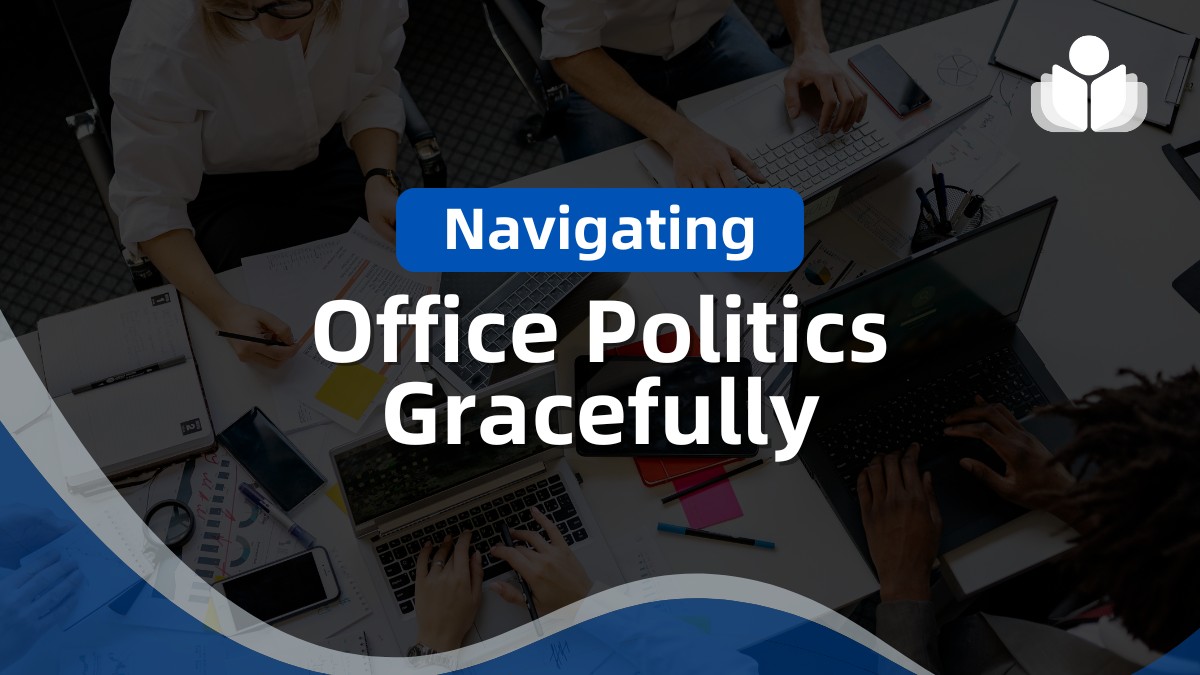Office politics refers to the informal dynamics of power, influence, and relationships within a workplace. These politics are present in nearly every organization and shape decisions, promotions, and collaborations. Navigating office politics is essential for career advancement, maintaining solid relationships, and fostering a positive work environment. Mastering this skill helps you avoid conflicts, build trust, and manage difficult situations.
In this article, we’ll explore practical strategies for gracefully handling office politics while preserving your integrity. These strategies will ensure you can thrive professionally without getting caught in negativity.
Understanding Office Politics
What Is Office Politics
Office politics refers to the informal, often unseen, power dynamics and relationships within an organization. It encompasses how individuals and teams influence decisions, build alliances, and navigate conflicts, often outside of formal job roles. These dynamics can significantly affect decisions, who gets noticed for promotions, and how resources are allocated within the company.
Common Scenarios
Office politics can manifest in various ways, such as:
- Competition for Promotions: When several employees vie for the same leadership position, alliances or favoritism may arise.
- Forming Alliances: Colleagues may band together to formally support each other’s agendas through teamwork or informally through personal relationships.
- Differences in Management Styles: Conflicts can arise between employees and leaders with differing views on approaching tasks, managing teams, or setting priorities.
- Resource Allocation: Departments or individuals may compete for budgets, time, or personnel, leading to political maneuvering.
Why Office Politics Matters
Office politics has a direct impact on:
- Career Progression: Those who understand and navigate office politics effectively are often better positioned for promotions, leadership roles, and recognition.
- Teamwork: Positive or negative political dynamics can influence team collaboration and effectiveness, fostering a cooperative environment or creating division.
- Job Satisfaction: Navigating office politics can lead to a more rewarding work experience while being caught in negative politics can cause stress, dissatisfaction, and disengagement.
By understanding and navigating office politics wisely, employees can maintain positive relationships and ensure their contributions are recognized in ways that support their career goals.
Self-Awareness in Office Politics
- Assessing Your Role: Take time to understand your place within the workplace dynamics. Consider your relationships with colleagues, influence level, and how others perceive you. This helps you navigate situations with clarity and purpose.
- Recognizing Triggers: Identify moments when you’re drawn into office politics, such as competition for recognition or promotions. Recognize these triggers early and approach them calmly, staying focused on long-term goals instead of reacting impulsively.
- Emotional Intelligence: Cultivate emotional awareness by observing your reactions in tense situations. Understand your emotions and those of others to maintain professionalism, respond thoughtfully, and prevent escalation. This balance of self-awareness, emotional intelligence, and recognizing triggers allows you to navigate office politics gracefully without losing sight of your values.
Building Positive Relationships
- Networking With Integrity: Focus on building authentic, trust-based relationships with coworkers at all levels. Be approachable, actively listen, and offer help without expecting immediate returns. Show genuine interest in others’ work and goals.
- Collaboration Over Competition: Prioritize teamwork and shared success over personal gain. Support your colleagues’ efforts, share credit for wins, and work towards common goals rather than undermining others to get ahead.
- Balancing Friendships and Professionalism: Maintain clear boundaries between personal friendships and work relationships. Keep interactions respectful and professional during work hours, and avoid letting personal feelings affect your professional decisions or behavior.
Avoiding Negative Office Politics
- Steering Clear of Gossip: Avoiding gossip is essential to maintaining a positive reputation. Engaging in office rumors or talking behind colleagues’ backs can damage trust and undermine your credibility. Stay professional by focusing on facts and avoiding negative conversations.
- Managing Conflict Diplomatically: When conflicts arise, address them calmly and respectfully. Listen to all perspectives, focus on resolving issues rather than assigning blame, and approach disagreements with a solution-oriented mindset. Maintaining professionalism will help preserve relationships.
- Staying Neutral in Power Struggles: When colleagues vie for influence or control, staying impartial is essential. Avoid taking sides, remain objective, and focus on your work. Staying neutral helps avoid unnecessary drama and keeps you aligned with the company’s goals, not personal rivalries.
Influencing Without Manipulation
- Lead by Example: To positively influence office culture, it’s essential to lead by example. This means showing professionalism in all interactions with peers, subordinates, or supervisors. Simple actions like consistently meeting deadlines, staying calm under pressure, and showing respect to everyone can set a powerful example for others. By embodying the values you want to see in the workplace, integrity, collaboration, and accountability, you can encourage others to follow suit, ultimately creating a more positive and cohesive office environment.
- Building Credibility: Credibility is critical to influencing without manipulation. You can build trust and respect by consistently delivering high-quality work, being reliable, and keeping your commitments. Transparency in your actions and decisions is equally important. When people know they can rely on your word, they are more likely to trust your intentions. An honest and hardworking reputation enhances your influence with no political maneuvering.
- Effective Communication: Advocating for yourself and your ideas is critical without engaging in office politics. Always aim for clear, concise, and assertive communication. When presenting ideas or feedback, focus on facts and solutions rather than emotions or personal opinions. This professional approach ensures that your message is heard and respected. Actively listening to others and showing empathy can help build rapport and ensure that your influence comes from mutual understanding, not manipulation.
Dealing With Difficult Personalities
Identifying Power Players
- Power players are individuals with significant influence, even if they don’t hold formal titles. They sway decisions and have strong connections with leadership.
- To navigate relationships with them, observe who others seek for advice and build respectful, professional connections.
- Engage by offering value and aligning your work with their goals, but maintain your independence and integrity.
Handling Manipulative Colleagues
- Manipulative colleagues may use tactics like gossip, undermining, or withholding information to gain an advantage.
- Set firm boundaries and avoid reacting emotionally. Stay objective and focus on facts.
- Address manipulative behavior calmly and professionally. Document interactions in case issues escalate.
- Seek support from a manager or HR if manipulation becomes disruptive.
Staying Professional Under Pressure
- Maintain your composure during tense situations, focusing on long-term career goals rather than short-term office politics.
- Use neutral, diplomatic language to manage conflict without escalating it.
- Build a network of trusted colleagues and mentors to support you when facing challenges.
Navigating Career Advancement in a Political Environment
- Positioning Yourself for Success: Building a solid personal brand is crucial to career advancement in a political environment. Focus on demonstrating consistent results, reliability, and expertise in your field. Ensure your achievements are visible by sharing successes during meetings and performance reviews and updating your LinkedIn profile with critical milestones. Advocate for promotions by highlighting your contributions and asking about growth, but do so respectfully, avoiding manipulative or overly aggressive tactics.
- Getting Support from Mentors and Allies: Mentors and sponsors can provide invaluable guidance and open doors for you. Cultivate relationships with experienced professionals who can advise and advocate for you within the organization. Having allies across departments can enhance visibility and help you navigate complex power dynamics. Use these relationships to seek honest feedback, gain perspective on the political landscape, and build a support network.
- Balancing Ambition With Integrity: Stay true to your values while striving for career advancement. Focus on collaboration, not competition, and avoid undermining colleagues to get ahead. Be transparent about your goals and seek opportunities to grow based on merit. By maintaining integrity and fairness, you can build a reputation as a leader who lifts others up while advancing yourself, creating lasting career success without engaging in toxic politics.
Ways to Use Office Politics Positively for Professional Growth
Office politics are often viewed negatively, but when approached with integrity and purpose, they can be a powerful tool for professional growth. One key strategy is to build strong relationships across all levels of your organization, not just with your immediate team.
Stay aware of the company’s informal networks and power dynamics, but avoid manipulative tactics. Instead, focus on influencing others through trust, collaboration, and shared goals. Be authentic in your interactions, and balance ambition and fairness. Recognize the importance of emotional intelligence in understanding the motivations and concerns of others.
Use office politics to champion positive change, fostering a culture of respect and cooperation. Avoid gossip and drama, staying focused on creating value for the organization. Ultimately, the goal is to use office politics ethically, advancing your career while contributing to a healthier workplace environment.
Conclusion
Navigating office politics gracefully is critical to maintaining strong professional relationships and advancing your career without compromising your values. You can avoid the pitfalls of negative office politics by staying mindful of your actions and focusing on building positive, genuine connections.
Prioritize integrity, professionalism, and effective communication to foster a more collaborative and supportive work environment. Remember, office politics is a natural part of any workplace, but with grace, respect, and a focus on teamwork, you can navigate it successfully and maintain a positive reputation.
 Sections of this topic
Sections of this topic
















